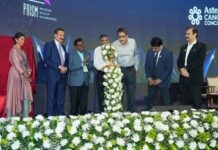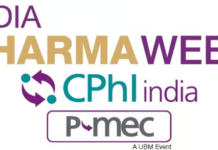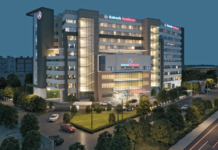New Delhi March 6, 2014:- 1. It is indeed a happy occasion for me to be present amidst you this evening to receive the recommendations of India’s first-of-its-kind global Healthcare Conference – The Future of Healthcare: A Collective Vision which was held on yesterday and today in New Delhi.
2. This Conference has provided a useful platform to harness experiences and expertise in the field of healthcare, from countries around the world. I am pleased to receive the four White Papers developed by the members of the Healthcare Alliance. These are an outcome of the contributions and perspectives garnered from global experts in the field. I hope that the recommendations for the Government, healthcare providers, industry and the community at large would serve to be valuable inputs in charting the future course of healthcare in the coming years.
3. I am informed that this innovative initiative – The Healthcare Alliance is a partnership between industry, the private sector and global consultancies and is supported by luminaries of the healthcare sector both from India and abroad. As I understand, we have experts and innovators from Joslin Diabetes Center, Duke University, Harvard University, Stanford University and many other renowned global organizations, amidst us. I am also pleased to know that several India’s leading industry bodies have come together for this cause reaffirming the critical importance of good health in nation building. I compliment the leadership of Apollo Hospitals for envisioning the Conference which is a meaningful step forward towards our shared goal of a healthier nation tomorrow. The focused perspectives in the White Papers would be a positive step towards a practical and collaborative commitment for the betterment of health of the people.
Ladies and Gentlemen,
4. Healthy citizens are integral to building a healthy economy. Most often people do not fully comprehend the fundamental correlation between the state of a nation and the health of it’s people. Though India has made significant inroads in the healthcare sector since independence, a lot more still remains to be done. It is necessary to create an efficient healthcare delivery system, one that provides high quality, affordable medical facilities to the people, and in particular, to the weak and disadvantaged sections of society. India’s health indices need to improve to achieve the Millennium Development Goals and meet the World Health Organization mandates.
5. The need of the hour is for a much greater convergence of all stakeholders towards the common goal of an improved healthcare delivery system. The National Rural Health Mission proved to be a landmark initiative and contributed immensely to the restructuring of health services in rural India. Now, the National Urban Health Mission envisages to meet health care needs of the urban population with a focus on the urban poor, by making essential primary health care services available to them and reducing their out of pocket expenses for treatment. This will be achieved by strengthening the existing health care delivery system, targeting the people living in slums and converging with various schemes relating to wider determinants of health by various Ministries.
6. Disease prevention is imperative and it has to encompass efforts to anticipate the genesis of disease and forestall its progression to medical manifestations. Focus needs to be on early detection of diseases. There is a wide recognition that non-communicable diseases are the biggest public health challenge that the world faces today. The global burden from non-communicable diseases is significant and is rising at a rapid pace. This burden would pose a substantial threat to India’s socio-economic development. Preventive and health promotion programmes, public awareness andbehaviour change communication would undoubtedly be important steps to prevent non-communicable diseases.
7. It is also important not to lose focus on the fact that a powerful driver of health is education. The strong linkage between poverty, lack of education and limited access to health services is well recognized. Healthcare infrastructure and initiatives therefore need to be complemented by empowerment through education, especially of the girl child.
Ladies and Gentlemen,
8. Innovative models of partnership between the public and private sectors can improve the situation in India and also provide insights for the developing world. A sustained focus on healthcare excellence in India is crucial not only for our nation, but the world at large. India is a regional resource for high quality care. As one of the largest manufacturer and exporters of medicine, India has brought cost efficiency to the world in the generics domain. This is a huge advantage that needs to be leveraged further.
9. ICT can be a strong enabler in strengthening the reach of medical information and care. Our healthcare systems must gear up to fully utilize this potential. Advanced satellite technology is enabling telemedicine systems that can connect remote healthcentres with Super Specialty Hospitals in far away urban areas. Technology has the power to transform healthcare. Effective and inexpensive cure, reduction of our reliance on costly imported medical equipment can all be met with an added thrust on indigenous technology. The Science, Technology and Innovation Policy, 2013 which makes innovation a key goal should be leveraged by our medical schools, research laboratories, and the pharmaceutical and instrumentation industries to further the cause of Indian healthcare. Moreover, ICT companies should also focus on strengthening the capabilities of medicine and healthcare delivery through the mobile phone – a device now in the hands of millions of Indians.
10. As our battle against polio has shown, collective efforts can really make miracles happen. India has completed three years without a single case of the debilitating infection and the WHO certification for India celebrates this success. It also underlines the importance of having a multi – faceted inter – sectoral collaboration between various partners to achieve the shared goal of “Health for all”.
Ladies and Gentlemen,
11. Over the centuries, India has been renowned as a land of healing. History provides us enough evidence that healing traditions have flourished in our nation since the Vedic ages. The post-Vedic age saw some of India’s most powerful healthcare systems come to the fore. The earliest and the most popular of these is the great Indian tradition of Ayurveda. Other than Ayurveda, India’s strong culture of cure gave rise to other popular systems like Rasashastra and Siddha. It is promising to note that today,traditional Indian healthcare is recognised and respected the world over. Leading healthcare providers around the world are exploring the incredible promise of our traditional healing. This is an avenue that should be further dwelt upon and we may possibly discover new cures for the new-age medical problems.
12. The world is now looking up to India, much more than ever before. India is recognized for its great innovation and professional skills. We must now add robust health to that list –we must aim at becoming a healthy super power. The march to good health cannot be delayed; it is the key to sustaining our success story in the long run. However, for it to become a revolution it must include the citizens of the country. Swami Vivekananda once observed and I quote: “Take up one idea. Make that one idea your life – think of it, dream of it, and live on that idea. This is the way to success” (Unquote). To transform the ideas emerging out of the Healthcare Conference into a reality, all stakeholders need to make collective efforts in the direction of achieving good health for all. I urge all present to make it their mission to infuse in all a passion for healthy living. My best wishes to the Healthcare Alliance for its mission of providing equitable healthcare to the people. Let us all strive collectively for a better and healthier tomorrow.
Thank you.
























